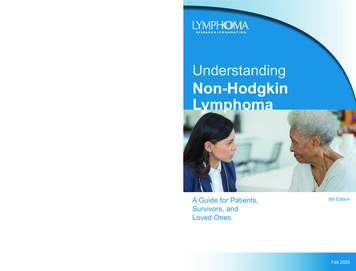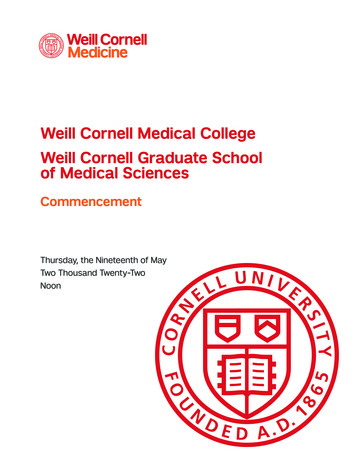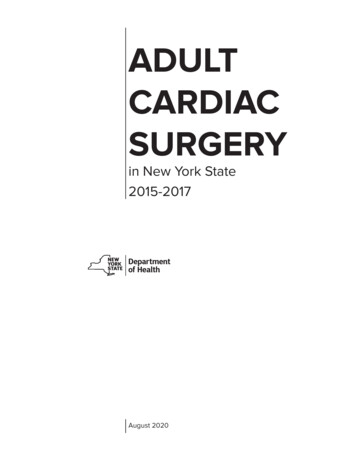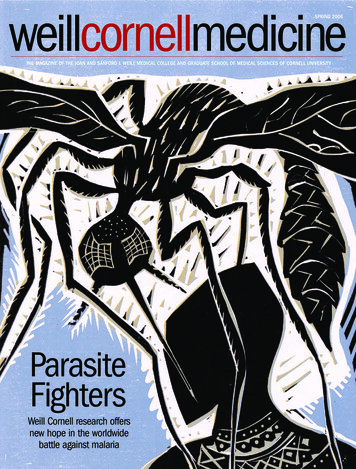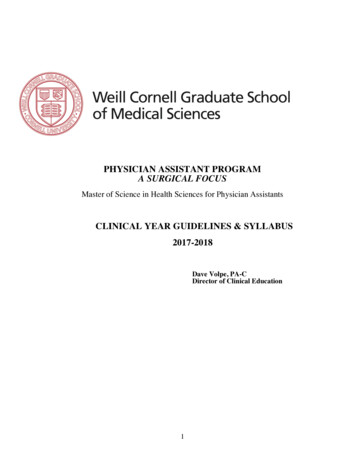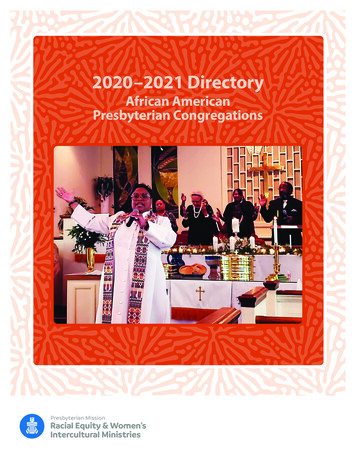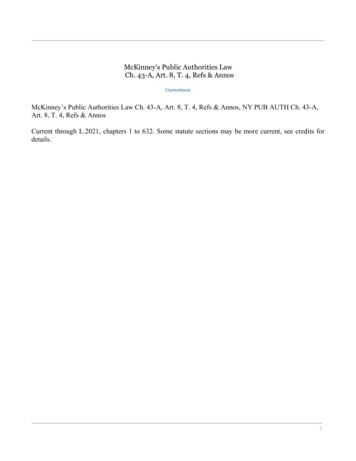
Transcription
New York-Presbyterian HospitalWeill Cornell MedicineTraining Programs in Clinical Psychology2023-2024
Susan Evans, Ph.D., DirectorPsychology Internship Training ProgramNewYork-Presbyterian HospitalWeill Cornell MedicineNewYork-Presbyterian Hospital/Weill Cornell Medicine is one of the world'sleading institutions for the care of the sick, and is renowned for its teaching, research,and preventative medicine. New York-Presbyterian Hospital (formerly known as theNew York Hospital) is the oldest hospital in New York State and the second oldest inthe United States, created by royal charter in the reign of King George III in 1771. Fromits inception, the Hospital has treated psychiatric patients. The present hospital complexopened in 1932 on a site overlooking the East River in Manhattan. The complexincludes the Weill Cornell Medical College, New York-Presbyterian Hospital, TheMemorial Sloan-Kettering Cancer Center, and The Hospital for Special Surgery. Themission of NewYork-Presbyterian Hospital highlights a commitment to excellence inclinical service, education, research, and community service. Specifically, its mission is“dedicated to:Educating the next generation of health care professionals.Developing groundbreaking research,Advancing innovative, patient-centered clinical care,Serving the needs of our local, national, and global community.”(https: infonet.nyp.org/Pages/Culture.aspx)Founded in 1898, Weill Cornell Medical College (WCMC), Cornell University'smedical school located in New York City, is committed to excellence in research,teaching, patient care and the advancement of the art and science of medicine, locally,nationally, and globally. Affiliated with NewYork-Presbyterian Hospital (NYPH) since1927, NYPH is the nation's largest not-for-profit, nonsectarian hospital, providing stateof-the-art inpatient, ambulatory, and preventive care in all areas of medicine. NYPH isthe number one hospital in the New York metropolitan area and is consistently rankedamong the best academic medical institutions in the nation, according to U.S. News &World Report.Payne Whitney Clinic and The Westchester Behavioral Health Center are thepsychiatric sections of the New York-Presbyterian Hospital Weill Cornell MedicalCenter. The Payne Whitney Clinic, endowed by Payne Whitney in 1927, was built as anintegral part of the Medical Center, and in 1932 was designated as the Manhattan site
of the Department of Psychiatry. In 1821, the Hospital established a separate division,the Bloomingdale Hospital (1821-1889), for the care of the mentally ill, located at thepresent site of Columbia University. In 1894 that hospital was moved to a 236-acresetting in White Plains, thirty miles from New York City and today is known as TheWestchester Behavioral Health Center.The Psychology Internship ProgramPhilosophy and Training ModelThe Department of Psychiatry at NewYork-Presbyterian/Weill Cornell Medicinemaintains an APA-accredited Predoctoral Internship Program that is dedicated totraining interns to be competent clinical scientists. The training program upholds theeducational goals of providing comprehensive, quality training in clinical psychology inboth direct services and research domains.This philosophy of training is consistent with the mission of the Hospital aimed to deliverexcellence in patient care, teaching, and research. To accomplish this mission, theInternship Program follows a clinical science model of training. This experiential modelinvolves immersing the interns in core areas of clinical psychology including psychiatricdiagnosis and evaluation, neuropsychological assessment, evaluation and consultationof acutely ill patients, and empirically supported psychotherapies of a heterogeneouspatient population.The NYP-WCM internship fosters a training culture in which differences among faculty,trainees, staff, and patients is valued and respected (including, but not limited to,difference in race, ethnicity, sexual orientation, gender identity, sex, ability, religiouspractice, socioeconomic class, citizenship, age, and life experience). We are committedto developing practices that champion diversity, equity, and inclusion in areas of patientcare, education, professional development, and advocacy.The Internship Program is a member of The Academy of Psychological ClinicalScience.Training GoalsThe primary goal of the NewYork-Presbyterian Hospital/ Weill Cornell MedicinePsychology Internship is to train interns to become clinical scientists. The education andtraining model emphasizes direct clinical service and a range of clinical experienceswith our faculty. The Internship teaches facts and theories in clinical psychologyincluding knowledge of the current diagnostic system, current theories and models ofpsychopathology, theories and methods of psychotherapy and clinical intervention,
principles and administration of psychological and neuropsychological tests, andmethods and practice of consultation and supervision. Interns are expected to developcompetencies in the areas of research, ethical and legal standards, individual andcultural diversity, professional values, attitudes, and behaviors, communication, andinterpersonal skills, assessment and diagnostic evaluation methods, intervention,supervision, and consultation. To achieve these goals, the program is structured withtraining sessions and seminars in the beginning of the academic year. Competenciesare measured at intervals during the year with the expectation that competenciesincrease in strength over the course of the year.Another goal of the program is to stimulate an area of expertise within a clinical area tofacilitate a deepening of knowledge and skill. To achieve this goal, interns participate infour-month clinical rotations choosing from a wide number of settings (e.g.Psycho-oncology, Women’s Health, Child and Adolescent Psychiatry, InpatientPsychiatry). Finally, the Program seeks to foster training for interns interested inpursuing clinical research careers. To this end, the Internship offers a ResearchPlacement Program (RPP) that guarantees 4-6 hours of protected time for an intern toconduct research with a mentor with whom they share clinical and academic interests.Interns who have completed their dissertation are eligible for this program. It isexpected that by the end of the year, the intern’s activities will have translated intoauthorship on manuscripts and/or presentations at national conferences. Scholarlyinquiry is fostered for all interns through a range of venues including Psychiatry andPsychology Grand Rounds, seminars, research presentations and lectures.COMPTENCIES FOR INTERNSHIP TRAININGCompetency 1. Displays necessary self-direction in gathering clinical and researchpractice independently and competently. Seeks out scientific knowledge to enhanceknowledge about clinical practice and other relevant areas.Competency 2. To have knowledge of and competence in ethical principles and practiceas well as legal standards for clinical psychology.Competency 3. Displays sensitivity to the cultural and individual diversity of patients andcommitted to providing culturally sensitive services.Competency 4. Demonstrates professional and appropriate attitudes and behaviors withpatients, treatment teams, staff, peers, and supervisors.Competency 5. Communicates effectively and collaboratively with patients, supervisors,staff, and colleagues.
Competency 6. Demonstrates a thorough working knowledge of psychiatric diagnosticnomenclature and DSM multiaxial classification. Has a working knowledge ofneuropsychological assessment strategies.Competency 7. Provides competent, effective, and evidenced based psychotherapy torange of patients presenting to the medical center.Competency 8. Demonstrates knowledge of the supervisory role in clinical practice asconsumer and provider. Employs these skills in a consistent and effective manner inpeer consultation and with supervisors.Competency 9. Performs assessment of patients referred for consultation and providesappropriate level guidance to other health professionals.Core Clinical ExperienceThe core curriculum includes attendance at core didactic seminars, training indiagnostic evaluation, assessment of acutely ill patients and adult psychotherapy.Interns conduct psychiatric evaluations weekly in the evaluation service, conductevaluations and triage acutely ill patients in the Comprehensive Psychiatric EmergencyProgram (CPEP) and provide individual weekly psychotherapy to adult patients.*During the COVID-19 Pandemic, interns have conducted outpatient services over zoom.Supervision and clinical training have been mostly virtual. Participation in the CPEP has beenlimited. As the pandemic recedes, interns can expect to conduct patient services and receivesupervision in person.Standing Didactic SeminarsCognitive Therapy Clinic Video Case Conference - Monday 1:00-2:00 PMThe Cognitive Therapy Clinic case conference focuses on group supervision ofindividual cases. Interns and fellows participating in the case conference presentvideotape clips of their work with patients to receive feedback from the group onquestions related to implementation of empirically supported therapies, therapist skilland therapy process. Dr. Evans supervises this seminar.Cognitive Therapy Clinic Disposition Planning Meeting - Monday 2:00-3:00 PMThe Cognitive Therapy Clinic Disposition Planning meeting focuses ondiscussing diagnosis and treatment planning for cases that were seen in evaluationservice. In addition, throughout the year, didactics are included which focus on thepsychiatric interview and mental status exam. Dr. Evans supervises this meeting.
Professional Development Meeting – alternate Mondays 3:00 - 5:00 PMThe Professional Development meeting focuses on all aspects of the InternshipProgram and allows the interns and Director the opportunity to discuss and explorecareer opportunities and development. Occasionally, July-September will deal withorientation to the Internship Program and preparation for Postdoctoral Fellowships (withadditional coverage on ethical and legal topics and diversity training and research andwriting. The second half of the year is devoted to discussion of career paths andeducation around a particular topic provided by former interns.Neuropsychological Testing Seminar – alternate Mondays 4:00-5:00 PMThe seminar is designed to expose clinical psychology interns to a broad range ofneuropsychiatric disorders that result in comorbid cognitive and emotional dysfunction.Each one-hour seminar is framed around a brain-behavior neuropsychologicalperspective of the pathophysiology and treatment of a range of disorders includingdepression, post-traumatic stress disorder, attention-deficit/hyperactivity disorder,traumatic brain injury, stroke, dementia, functional neurological disorder, and substanceuse. Special attention is paid to how the brain-based cognitive sequelae of thesedisorders can manifest in a clinical interaction and psychotherapy. Additional topicsinclude the use of cognitive-behavioral strategies to target attention, organization,procrastination, and memory. Psychology interns can present cases that relate to thetopics (e.g., cases such as an older adult patient with depression and comorbidexecutive dysfunction and another with co-occurring PTSD and cognitive impairmentafter hospitalization in an ICU). Certain seminar topics are also organized as a journalclub to allow for psychology interns to engage in critical thinking around especiallyimpactful issues in neuropsychology (e.g., effect of cannabis use on cognition, longterm impact of head trauma in athletes). Finally, psychology interns learn foundationalskills in being consumers of neuropsychological reports, with specific seminars devotedto reading and interpreting neuropsychological evaluation data.The Neuropsychological Testing seminar includes both didactics and casepresentations. Dr. Abhishek Jaywant supervises this seminar.Psychology Grand Rounds - Third Thursday of the Month 12:00 - 1:00 p.m.The Psychology Grand Rounds meeting occurs on the third Thursday of the month.Meetings until further notice are held via Zoom. Each month features a presentation ofexpert clinical and research psychologists and discussion in which the faculty, staff,postdoctoral fellows, and interns are engaged. (See appendix X for list of 2021-2022grand rounds).Other required seminars and trainings:Summer Cognitive Behavioral Therapy Course (July-August)The psychology interns and psychiatry residents attend this six-week course.Participants learn core processes and skills of CBT. The program is highly experientialwith the interns and residents practicing core skills through interactive measures suchas role plays and a adopting a self-change project. (Susan Evans, Ph.D., NathanThoma, Ph.D., Jamie Schumpf, Ph.D., Kate Herts, Ph.D.)
Evaluation Service Seminar: This seminar is led by the supervising psychiatrist in theevaluation service. The seminar addresses the structure of the psychiatric interview,note writing, evaluating suicide risk and procedures. Lecture one covers the PsychiatricInterview (goals, approach, safety issues, confidentiality, methods, interventions,organization), Diagnostic Evaluation (necessary components), Mental Status Exam andSuicide Assessment. Lecture two covers Introduction to Competencies inPsychopharmacology (basic categories of psychopharmaceuticals, indications,risks/benefits) and Writing an Evaluation and Progress Note. Lecture two covers briefreview of DSM V, focusing on changes from DSM IV to DSM V. (Diana Feldman, M.D.)Seminar in Ethical and Legal Standards- Dr. Dawn Hughes is a board-certifiedforensic psychologist. She teaches two 2-hours ethics seminars entitled Ethics andProfessional Risk Management in the Practice of Psychology to the psychology internsin an interactive format with case examples and vignettes that are guided bythe American Psychological Association (APA) Ethical Principles and Professional Codeof Conduct (EPPCC) (APA, 2017). This course addresses professional riskmanagement and ethical concerns through the lens of real-world and contemporarydilemmas that psychologists confront. Topics covered include common EPPCCstandards and principles including informed consent, confidentiality and privilege,clinical documentation, an exploration of boundaries crossings and boundary violations,self-disclosure, mandated reporting, and managing suicidal patients. These seminarsprovide a framework to contemplate ethical dilemmas with forethought and to makeinformed decisions that protect clients from harm and mitigate professional risk. (DawnHughes, Ph.D.)Weill Cornell Diversity, Equity, Inclusion (DEI) Reading Groups. This is amultidisciplinary group that meet quarterly throughout the academic year includesfaculty, departmental staff, and psychology and psychiatry trainees. The goals ofthe group are to 1) improve knowledge and awareness of DEI topics as they pertain topsychiatry; 2) provide a structured and safe environment to discuss DEI topics in theworkplace; 3) spark interest in future conversations and action surrounding DEI in thedepartment. These facilitated small groups meet quarterly during the academic year.Seminar on diversity, inclusion, equity- Interns discuss experiences with consideringmultiple aspects of their own and their patients’ identity (e.g., race, ethnicity, gender,sex, socioeconomic status, ability) in therapy. Topics discussed include when and howto discuss of difference and similarity in CBT; the ADDRESSING (age, developmentaldisabilities, acquired disabilities, religion, ethnicity, sexual orientation, socioeconomicstatus, indigenous group membership, nationality, and gender) model of the importanceof considering complexities of individual identity; microaggressions in clinical practice;and how identity can affect the multiple levels of CBT case conceptualization. Caseexamples are used as well as material from readings (e.g., “Racial microaggressions ineveryday life: implications for clinical practice,” Sue et al., 2007; “Microaggressions inClinical Training and Practice,” Overland et al., 2019). Interns are encouraged tocontinue discussion of identity and its impact on therapy and case conceptualizationwith their supervisors. (Elena Mayville, Ph.D., leads this seminar).
Workshop series on delivering culturally responsive clinical assessments andinterventions. This seminar is led by a steering committee of psychologists,psychology postdoctoral fellows, and social workers, geared towards providing skills,strategies, and resources for delivering culturally responsive care to the patientpopulation at NYP. Topics covered during these quarterly workshops include strategiesand resources for providing culturally responsive clinical assessments and interviewingof symptoms, as well as the delivery of culturally informed interventions. During eachstructured workshop, educational materials are read or viewed, analyzed, andprocessed, and resources are made available to all attendees interested inincorporating the skills taught in their clinical work. Feedback is also collected regularlyto ensure workshops are experienced as productive and welcoming to all, and topicsinclude those that attend are interested in learning more about. (Stephanie Cherestal,Ph.D. organizes this seminar).Seminar on supervision-The APA and psychology training programs have increasedefforts to view clinical supervision as its own entity, and to allow students to learn aboutthis essential gatekeeping role earlier in their graduate school training. In the past, itwas assumed that any clinician could be a competent clinical supervisor if they hadbeen supervised. The goal of this seminar is twofold. Interns will explore theories ofclinical supervision (e.g., cognitive behavioral, psychodynamic, and other evidencebased modalities) through readings, videos, and guided discovery. Interns areencouraged to explore and discuss their own experiences of supervision, past andpresent, to become cognizant of what has been helpful and transformative. In addition,interns will supervise one other using the Cognitive Therapy Rating Scale (CTRS) tofurther clarify their attitudes and beliefs about what constitutes effective clinicalsupervision. (Lori Davis, Psy.D. is the seminar leader).Elective RotationsIn addition to the core curriculum, interns participate in elective rotations. Each rotationis for a four-month period, so the intern can participate in at least two rotations over thecourse of the year. Some of the rotations may take place at The WestchesterBehavioral Health Center and Memorial Sloan Kettering Cancer Center (MSKCC).Listed below are currently designated rotations:1) Anxiety and Traumatic Stress Studies2) CBT Child Anxiety and Tic Program3) Youth Anxiety Center4) Memory Disorders Program5) Personality Disorders Institute6) Memorial Sloan Kettering Cancer Center7) Pediatric Behavioral Health Psychology8) Women’s Health Program
9) Neuropsychology10)Inpatient Psychiatry at WBHC (Women’s Unit, Borderline Unit, TheHaven, Eating Disorders Unit, Adolescent Inpatient Unit).*Psychological testing occurs in the rehab medicine unit with particular emphasis on basicneuropsychological and psychodiagnostics. Interns are responsible for consulting with thereferring clinician, administering the test battery, scoring the data, completing the report, andproviding feedback to the referring clinician. Dr. Abhishek Jaywant is the attendingneuropsychologist responsible for the supervision of interns on this rotation.If an intern has a particular interest in an area of psychology that is not listed, thetraining director will assist in developing an experience that is compatible with theintern’s clinical interests.Research Placement Program (Elective)Interns who have completed their dissertation are eligible for the Research PlacementProgram (RPP). 4-6 hours of protected time is carved out of the intern’s weeklyschedule to mentor with a clinical researcher. The training director facilitates anexperience for the intern with a faculty member with whom they share clinical andresearch interests.Other Educational ActivitiesAn array of ongoing educational activities at both the Payne Whitney Manhattan andWestchester supplements the formal curriculum and generates a stimulatingatmosphere for internship and fellowship training. These activities include:Psychiatry Grand Rounds: These consist of a weekly series of lectures in whichnationally distinguished scholars, clinicians and researchers are invited to speak aboutcurrent issues in psychiatry and psychology.Psychology Grand Rounds: This meeting takes place virtually and is a forum thatprovides the opportunity for psychology interns, postdoctoral fellows, and faculty topresent their research and clinical expertise.Geriatrics Seminar Series: This consists of a weekly series of presentations at theWestchester Behavioral Health Center by invited speakers on current developments ingeriatric psychiatry.Elective Seminars: These are offered each year by arrangement with interestedinterns, residents, fellows, and faculty. In recent years topics have included: BasicResearch Design in Clinical Psychology, Psychoanalysis and Literature, Psychotherapyand Psychoses, Adolescence, and the Technique of Psychotherapy.
Weill Cornell Medicine Wellness QlinicDepartment of Psychiatry partnered with medical students to develop the WCMWellness Qlinic Program, a program providing free mental health care and communityoutreach to LGBTQ populations in need, while also creating education, training, andacademic opportunities for students, trainees, faculty, staff. Interns may choose toparticipate as clinicians in the program.Safe Space: New Student-Run Clinic Offers Free Mental Healthcare to New York’sLGBTQ Community Weill Cornell Medicine PsychiatryEvaluation of Trainees and the Training ProgramContinuing evaluation of curriculum, faculty, and trainees is conducted at all levels ofboth the internship program. Every attempt is made to obtain a balance between theongoing personal dialogue that occurs between a trainee and their supervisors and themore objective data of direct observation and the completion of evaluation forms.Written evaluations of trainees are discussed with the trainee at mid and end of year.Direct observation via videotaped sessions of intern performance is evaluated andfeedback is given. The supervisor evaluates progression of the intern’s adherence totreatment and competency. Particular attention is given at the beginning of the year tothe ability to establish a therapeutic, working alliance and adherence to treatmentprinciples. Specific skills and competencies are expected to develop over the year andare evaluated by the supervisor. Interns can directly observe expert therapists viavideotape, patient interviewing and role-playing exercises. Trainees in turn are requiredto evaluate their supervisors and instructors utilizing a rating form.
Clinical, Academic and Research FacilitiesResearch Facilities: Clinical investigation is conducted on many services ofthe NewYork-Presbyterian Hospital. Research activities are ongoing in theProgram for Anxiety and Traumatic Stress Studies, the Women’s Program, theNeuroimaging Laboratory and Sackler Institute at the Payne Whitney Manhattan, theEating Disorders Program, the Youth Anxiety Center, the Adolescent Partial Hospital,the Center for Geriatric Services at the Westchester Behavioral Health Center, thePsychiatry Division of Memorial Sloan Kettering Hospital. also have ongoing structuresresearch programs. Computer facilities are available at all research sites. Interns areencouraged to participate in ongoing projects, or to begin their own projects withassistance from the faculty. Interns who wish to develop a research career may, withthe approval of the faculty, devote a portion of their time to mentored research activities.The Section of the History of Psychiatry and BehavioralSciences: Members of the section (psychiatrists, historians, and psychologists, as wellas residents, interns, and medical students) actively pursue a variety of research,ranging from Renaissance psychiatry to topics in the twentieth century. Many of theseprojects deal with the relationship between historical experience and contemporaryproblems. In addition to research, the faculty includes active teachers in thedepartment.The Memorial Sloan-Kettering Cancer Center Department ofPsychiatry: This Department provides psychiatric services to patients in one of thenation's foremost training hospitals in oncology. There is a major emphasis on researchinto the psychological and personality variables of patients with neoplastic diseases.Child and Adolescent Services: At the Westchester Behavioral Health Center, thereare inpatient and outpatient services for children and adolescents presenting with awide variety of psychiatric disorders. An inpatient unit for children from ages 6 to 12years of age and an adolescent inpatient unit provide treatment for those who require a24-hour therapeutic program. An adolescent eating disorder inpatient unit providesservices for adolescents presenting with an eating disorder, and who require aninpatient level of care. The child and adolescent outpatient department offerscomprehensive diagnostic evaluations and evidenced based treatment for children andadolescents through high school age. Treatment is provided through specialty clinics.The Center for Autism and the Developing Brain (CADB) serves individuals throughouttheir lifespan who need evaluation and treatment for autism spectrum disorders. Avariety of group programs are also provided for children, adolescents, and their parents.Comprehensive psychological and neuropsychological assessment services areavailable.
Child and Adolescent Services: At the Westchester Behavioral Health Center,there are inpatient and outpatient services for children and adolescents presenting witha wide variety of psychiatric disorders. An inpatient unit for children from ages 6 to 12years of age and an adolescent inpatient unit provide treatment for those who require a24 hour therapeutic program. An adolescent eating disorder inpatient unit providesservices for adolescents presenting with an eating disorder, and who require aninpatient level of care. The child and adolescent outpatient department offerscomprehensive diagnostic evaluations and evidenced based treatment for children andadolescents through high school age. Treatment is provided through specialty clinics.The Center for Autism and the Developing Brain serves individuals throughout theirlifespan who need evaluation and treatment for Autism Spectrum Disorders. A varietyof special group programs are also provided for children, adolescents and their parents.Comprehensive psychological and neuropsychological assessment services areavailable.Pediatric OCD, Anxiety, and Tic Disorders Program: The child psychiatry outpatientdivision at Payne Whitney Manhattan serves children and adolescents aged 5-18, andtheir families, offering evidence-based psychotherapy and psychopharmacologyinterventions. The Pediatric OCD, Anxiety, and Tic Disorders Program (POCAT)specializes in cognitive behavioral therapy (CBT) for kids and teens suffering fromanxiety and related disorders, including exposure and response prevention (ERP) forOCD and Comprehensive Behavioral Intervention for Tic Disorders (CBIT). Weeklyindividual therapy is offered, in addition to medication management as needed, andwhen possible, CBT groups are made available. In addition, Parent Training groups arerun throughout the year for interested parents. The catchment area for the ChildOutpatient Program is large, including all five boroughs of New York City, andsurrounding areas of Long Island, New Jersey, and Connecticut. The patient populationis thus culturally and economically diverse and presents with a wide range of psychiatricsymptoms and diagnoses, including the anxiety disorders, OCD, tic disorders, ADHD,mood disorders, impulsive or oppositional behaviors, and school refusal, among others.Interns can carry a weekly individual therapy caseload with close supervision in avariety of cognitive and behavioral therapies, co-lead groups if desired, work closelywith psychiatry trainees, and participate in weekly case conferences where members ofthe child psychiatry faculty live interview patients.Youth Anxiety Center: NewYork-Presbyterian's Youth Anxiety Center advanceseffective ways of diagnosing, treating, and helping teens and young adults sufferingfrom anxiety disorders through research, treatment, and education. A team of expertshas extensive knowledge about how anxiety affects young people, particularly as theytransition away from home into independent living. Clinicians can provide treatmentservices to young people and their families to facilitate this transition and help themcreate the lives they want to live. The Youth Anxiety Center is a unique collaboration of
researchers and clinicians who are all focused on the same goal: understanding the rootcauses of anxiety, which in turn leads to the development of better treatments. TheYouth Anxiety Center offers young people and their family’s real reasons to beoptimistic about the future.Substance Abuse Services: The Westchester Behavioral Health Center providesinpatient treatment of alcohol and drug abusers in addition to a special inpatient servicefor patients suffering from these problems.Libraries: Several libraries are available to interns. The Oscar Diethelm HistoricalLibrary is a unique historical collection of over 6,000 volumes published before 1950,plus a supporting Reference Collection of 4,000 modern works and the New YorkPresbyterian Hospital-Weill Cornell Medical Center Archives of Psychiatry. There also isan extensive collection of manuscript materials for study. The Payne Whitney Cli
Founded in 1898, Weill Cornell Medical College (WCMC), Cornell University's medical school located in New York City, is committed to excellence in research, teaching, patient care and the advancement of the art and science of medicine, locally, nationally, and globally. Affiliated with NewYork-Presbyterian Hospital (NYPH) since
